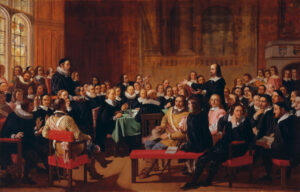At this site, I intend to be a secondary teacher. A secondary teacher is one who sees the primary purpose of his teaching to draw attention to the teaching the bible by building on the teaching of those who have gone before him. In a day in which many enter the realm of social media in order to draw attention to their own unique perspective on life in order to build a brand for themselves, I count it a great privilege to be a “secondary teacher.” Piper explains how as preachers, teachers, theologians, and the like we essentially stand on the shoulders of giants, likewise calling himself a secondary teacher, saying “the longer I live, the more clearly I see my dependence on those who have gone before. The more I know of what others have thought, the less original my thinking appears. I am content to have it so. For, at least in the realm of truth, the ancient Preacher does not overstate the case when he says: There is nothing new under the sun” (Ecclesiastes 1:9).”1 And he points out that, in all truth, “Edwards too was a secondary teacher—as we are all honest Christian pastors and theologians.”2 Indeed, the goal of Piper’s, Edwards’s, my, and all Christians’ lives is to draw attention to the great Teacher and to point people to His textbook, namely the Bible. As a young man, Edwards famously made a series of seventy resolutions or commitments, which by the grace of God he endeavored to keep in order to live a more God-saturated life. His 28th resolution was as follows: “Resolved, to study the Scriptures so steadily, constantly, and frequently, as that I may find, and plainly perceive, myself to grow in the knowledge of the same.”3 By God’s grace, I endeavor to do the same, building on and drawing attention to those most faithful of Christian preachers, pastors, theologians, historians (and the like), who have gone before me. I rejoice that God has called me as a secondary teacher and say with John the Baptist, “He must increase, but I must decrease” (John 3:30)
[1] John Piper, Collected Works, ed. Justin Taylor and David Mathis (Wheaton: Crossway, 2017), 5:22. Piper actually lays out several of the realities outlined above in his preface to volume 5 of his Collected Works.
[2] Works of John Piper, 5:22.
[3] Jonathan Edwards, “Resolutions,” in Letters and Personal Writings, ed. George S. Claghorn, in WJE (New Haven: Yale University Press, 1998), 16:755.



